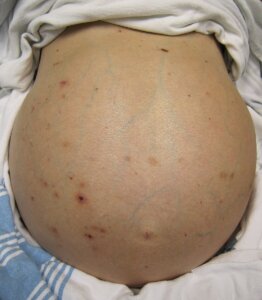A 42-year-old man with a longstanding history of alcohol abuse presents with tiredness, shortness of breath and marked abdominal distension. A photo of his abdomen is shown below:

Show Answer
This patient has obvious massive ascites, which is the pathological collection of fluid within the abdominal cavity. Healthy men have little or no intraperitoneal fluid, but women may normally have as much as 20 ml, depending on the phase of their menstrual cycle.
Image sourced from Wikipedia
Courtesy of Dr. James Heilman CC BY-SA 3.0
Show Answer
The accumulation of ascitic fluid represents a state of total-body sodium and water excess, but the event initiating the imbalance is unclear.
Approximately 75% of cases of ascites occur as a result of portal hypertension in the setting of liver cirrhosis, with the remainder being caused by infective, inflammatory, and infiltrative conditions.
Show Answer
A therapeutic paracentesis can be performed to relieve respiratory distress or abdominal pain resulting from the ascites.






What is the treatment plan after paracentesis